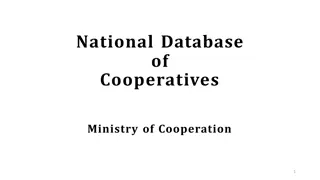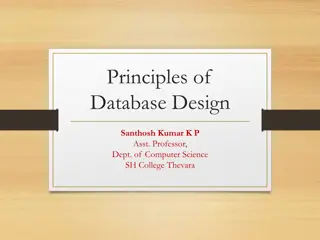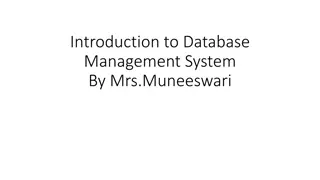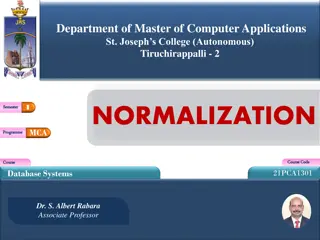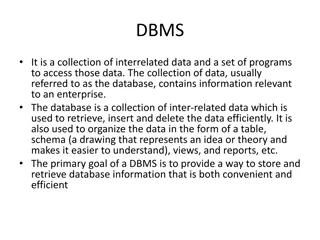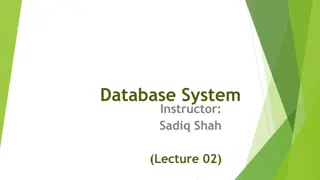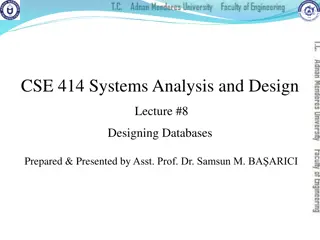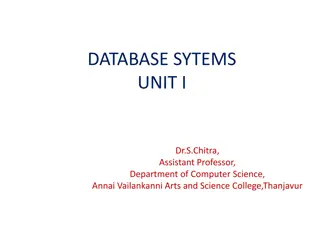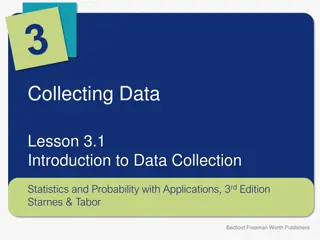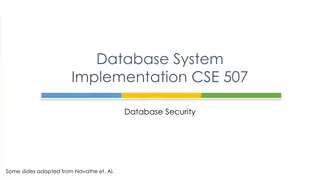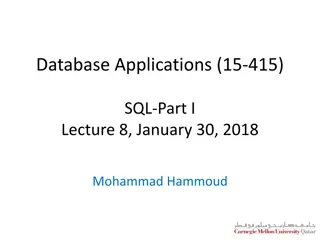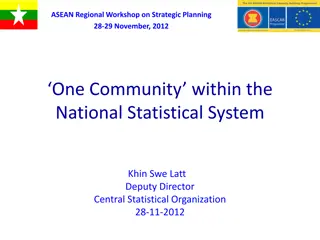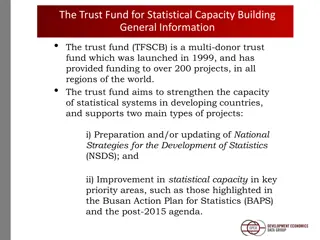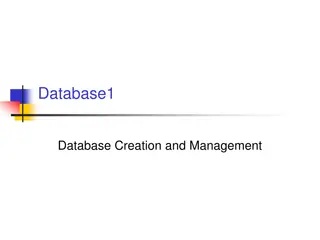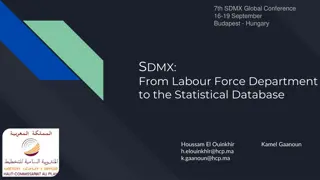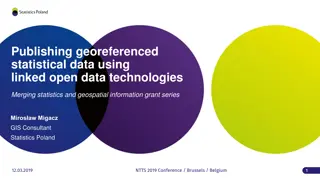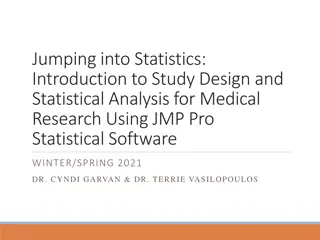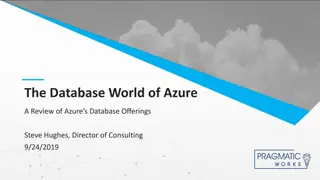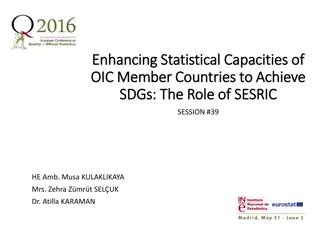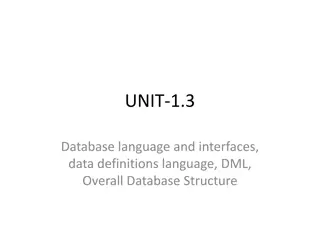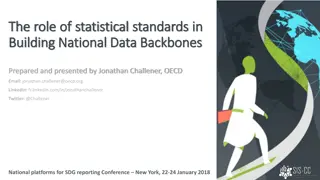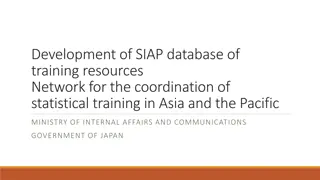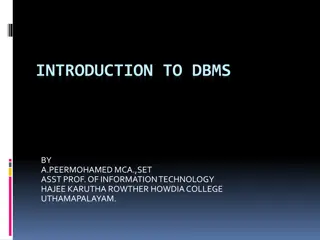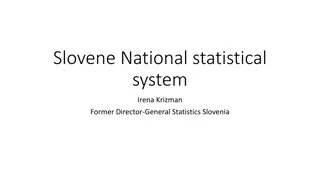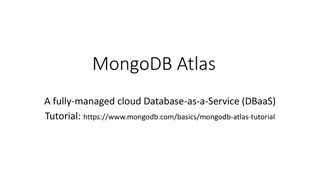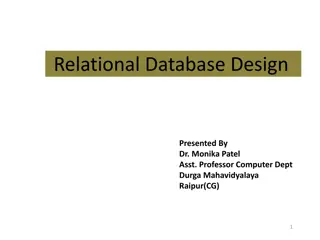National Database of Cooperatives: Ministry of Cooperation Initiatives
The Ministry of Cooperation is developing a National Database of Cooperatives to enhance transparency, governance, and policymaking in the cooperative sector. The database aims to provide comprehensive information on cooperatives across sectors, improve coordination among stakeholders, and facilitat
0 views • 22 slides
Database Design Principles and Management Overview
This document presents an overview of database design principles, including structured, semi-structured, and unstructured data types. It delves into the role of Database Management Systems (DBMS) in defining, constructing, manipulating, and sharing databases effectively. It also covers various types
0 views • 47 slides
Introduction to Database Management System Explained
This presentation covers the basics of database management systems, including definitions of data, types of data, structured and unstructured data, storing data in computers using file systems and database systems, and issues with file systems like data redundancy, inconsistency, difficult data acce
3 views • 18 slides
Database Normalization and Functional Dependencies
Database normalization is a crucial process that aims to improve database design by organizing data into higher forms of normality. This helps in reducing redundancy and ensuring data integrity. Functional dependencies play a key role in defining relationships between attributes in a database. By un
1 views • 33 slides
Oracle 19c Standard Edition: RAC Migration and Database Solutions Overview
Explore the implications of Oracle Database 19c Standard Edition no longer supporting RAC, and learn about disaster recovery and high availability options for users. Delve into the differences between HA and DR, along with the significance of workload isolation and scalability in database management
4 views • 22 slides
Database Management Systems (DBMS)
A Database Management System (DBMS) is a crucial tool for organizing, storing, and managing data efficiently. It allows users to create, update, retrieve, and delete data effectively, ensuring data consistency and security. DBMS software like MySQL and Oracle provide interfaces for various database
2 views • 21 slides
Costs and Risks of Implementing a Database Approach
Implementing a database approach involves additional costs and risks that need to be managed effectively. From hiring specialized personnel to dealing with conversion costs and organizational conflicts, organizations must carefully consider the implications of transitioning to a database system. The
2 views • 10 slides
Database Design Process and Concepts
This lecture on designing databases covers the database design process, normalization, transforming E-R diagrams, physical database design concepts, and steps in logical database modeling. It highlights the importance of logical and physical database design in system development, providing insights
1 views • 64 slides
Database Systems in IT
Database systems play a crucial role in managing and organizing data efficiently. They provide a structured environment for storing and accessing information, enabling various applications in sectors like banking, airlines, universities, sales, and more. The transition from traditional file systems
3 views • 38 slides
Variation in Statistical Studies
Variability is key in statistical studies, shaping the essence of statistical analysis. Students often struggle to grasp the concept of variability, despite being taught statistical methods. The term "variation" takes on different meanings in various statistical contexts, presenting challenges in co
3 views • 54 slides
Introduction to Data Collection & Statistics: Understanding Statistical Questions, Population, and Sampling
This material introduces the fundamental concepts of data collection and statistics. Learning objectives include distinguishing statistical questions, identifying populations and samples, and understanding the difference between observational studies and experiments. It discusses the process of stat
2 views • 14 slides
Entity-Relationship Diagrams (ERD) for Database Design
Entity-Relationship Diagrams (ERD) are vital in database design, illustrating entities and their relationships. They help in conceptualizing data models and laying the groundwork for database structures. The process involves identifying entities, defining relationships, and analyzing interactions to
1 views • 40 slides
Database Security Measures and Controls
Database security is crucial to protect against threats like loss of integrity, availability, and confidentiality. Countermeasures such as access control, inference control, flow control, and encryption are important for safeguarding databases. Access control involves creating user accounts and pass
1 views • 35 slides
Performers and Programs Database Webinar - Overview and Features
Learn about the Performers and Programs Database Webinar happening on October 22, 2021. This webinar, presented by Peter Kowalski and introduced by Sharon B. Phillips, offers valuable information about the database's features, including how performers advertise programs, categorization, virtual prog
1 views • 25 slides
SQL: Major Aspects and Functionality in Database Applications
SQL, as a relational database language, offers Data Manipulation Language (DML) and Data Definition Language (DDL) for querying and modifying data. Additionally, SQL encompasses triggers, embedded code execution, remote database access, transaction management, and security features for efficient dat
1 views • 52 slides
Overview of Database Systems Architecture and Languages
A database system is essential for storing and managing an organization's data. The architecture includes components like file manager, database manager, and query processor. Additionally, DML and DDL compilers play crucial roles in handling data manipulation and definition tasks. Various data struc
2 views • 28 slides
Exploring the Power of Wise Queries in Statistical Learning
Dive into the world of statistical learning with a focus on the impact of wise queries. Discover how statistical problems are approached, the significance of statistical queries, and the comparisons between wise and unary queries. Explore the implications for PAC learning and uncover key insights in
2 views • 8 slides
IBM SPSS for Statistical Analysis
IBM SPSS, formerly known as Statistical Package for the Social Sciences, is a powerful software package for statistical analysis used by researchers across various industries. Developed in the late 1960s, SPSS offers features for data management, statistical analysis, and data documentation. It simp
2 views • 13 slides
Overview of Myanmar Statistical System and Central Statistical Organization
The Myanmar Statistical System operates as a decentralized system with the Central Statistical Organization playing a crucial role at the national level. Various surveys and data collection efforts are undertaken by different ministries and agencies, coordinated by the CSO. The CSO compiles and pres
1 views • 18 slides
The Trust Fund for Statistical Capacity Building
The Trust Fund for Statistical Capacity Building (TFSCB) is a multi-donor trust fund launched in 1999, supporting over 200 projects worldwide to strengthen statistical systems in developing countries. It focuses on national strategy development and improving statistical capacity in key priority area
2 views • 5 slides
Database Management Systems and Concepts
Explore the world of databases with topics ranging from Database Creation and Management to Basic Database Terms. Learn about the significance of data, information, and metadata in decision-making processes. Discover the purpose of database systems and the role of Database Management Systems (DBMS)
2 views • 25 slides
SDMX Implementation for Statistical Database Management
This content outlines the implementation of SDMX solutions for managing a statistical database, covering updates, challenges faced, and solutions utilized. It highlights the creation of the database, updating processes, the challenge of lacking common data structure definitions, and the SDMX solutio
1 views • 11 slides
Flask-SQLAlchemy for Efficient Database Management
Flask-SQLAlchemy, a powerful tool for database management in Python, offers a seamless way to interact with databases using object-oriented concepts. By integrating SQLAlchemy's ORM capabilities with Flask, developers can simplify database operations and enhance productivity. This article provides a
1 views • 15 slides
Development of Guidelines for Publishing Georeferenced Statistical Data Using Linked Open Data Technologies
Development of guidelines for publishing statistical data as linked open data, merging statistics and geospatial information, with a primary focus on preparing a background for LOD implementation in official statistics. The project aims to identify data sources, harmonize statistical units, transfor
3 views • 31 slides
Jumping into Statistics: Study Design & Statistical Analysis in Medical Research
Explore the fundamentals of study design & research methodology, learn to select appropriate statistical tests, and practice statistical analysis using JMP Pro Software. Topics include research question formulation, statistical methods, regression, survival analysis, data visualization, and more. Un
0 views • 31 slides
The World of Azure Database Offerings
Exploring Azure's database offerings including Azure Cosmos DB and Azure SQL Database. Azure Cosmos DB provides a globally scalable document database solution, while Azure SQL Database is a great option for SQL Server workloads. Both platforms offer unique features such as low latency, scalability,
1 views • 15 slides
Enhancing Statistical Capacities of OIC Member Countries to Achieve SDGs: The Role of SESRIC
This presentation discusses the importance of enhancing statistical capacities in OIC member countries to achieve Sustainable Development Goals (SDGs), with a focus on the role of SESRIC. It covers the evolution of statistical definitions, the use of Statistical Capacity Index (SCI) for analysis, an
2 views • 17 slides
Enhancing Global Statistical Systems for Sustainable Development
The post-2015 development agenda emphasizes the need for a comprehensive global policy agenda, impacting statistical systems worldwide. This agenda seeks to improve data collection, coordinate international statistical efforts, and enhance national statistical systems by 2020 to support the Sustaina
0 views • 23 slides
Entity Framework in C# for Database Management
Entity Framework in C# offers a powerful ORM solution for data manipulation and database management. It allows developers to work with databases in an object-oriented manner, simplifying the handling of database operations. Learn about ORM, Code First approach, conventions, DbContext usage, and data
1 views • 21 slides
Database Language and Interfaces Overview
A database management system (DBMS) requires appropriate languages and interfaces to handle queries and updates for data manipulation and control. This includes Data Definition Language (DDL), Data Manipulation Language (DML), Data Control Language (DCL), and Transaction Control Language (TCL). Each
1 views • 12 slides
Role of Statistical Standards in Building National Data Backbones
The role of statistical standards in constructing national data backbones is crucial for efficient data dissemination and reporting, especially in the context of Sustainable Development Goals (SDGs). Statistical standards guide the orchestration of information flows within a national statistical net
0 views • 22 slides
Statistical Events in San Diego Area (2001-2003)
Several significant statistical events took place in the San Diego area between 2001 and 2003, featuring renowned speakers and experts in the field. These events covered topics such as meta-analysis, global atmospheric changes, statistical trends, and annual statistical career days. The gatherings p
0 views • 12 slides
Overview of the U.S. Federal Statistical System and Census Geography
The U.S. Federal Statistical System comprises 13 principal statistical agencies responsible for collecting and analyzing data across various sectors. The system includes agencies like the Bureau of Economic Analysis, Bureau of Labor Statistics, and U.S. Census Bureau. Geographic identifiers (GEOIDs
0 views • 94 slides
Development of Statistical Training Resource Database for Asia-Pacific by SIAP
Development of the SIAP database aims to coordinate statistical training resources in Asia and the Pacific. The database includes information on training courses, experts, materials, and schedules, facilitating data input and sharing for organizations and institutions. The database launch schedule a
0 views • 5 slides
Database Management Systems (DBMS): A Comprehensive Overview
This comprehensive overview of Database Management Systems (DBMS) covers the definition, environment, advantages, limitations, and characteristics of data in a database. It delves into the hardware and software components, user roles, and benefits of using a DBMS. The content highlights the control
1 views • 25 slides
Slovene National Statistical System Overview
The Slovene National Statistical System comprises institutions like the Statistical Office of the Republic of Slovenia and various advisory committees responsible for producing official statistical data following European and UN standards. It emphasizes neutrality, objectivity, transparency, and con
0 views • 9 slides
Getting Started with MongoDB Atlas - Fully Managed Cloud Database Service Tutorial
Explore MongoDB Atlas, a fully-managed cloud Database-as-a-Service (DBaaS) that simplifies database management. Learn how to create databases, collections, users, and documents within a MongoDB cluster. Get step-by-step guidance on setting up your free MongoDB Atlas account and managing your databas
0 views • 32 slides
Relational Database Design Fundamentals
This content delves into the crucial aspects of relational database design, including normalization, pitfalls, RDBMS design issues, and the overall database design process. It emphasizes the need for well-structured relation schemas to minimize redundancy, ensure data integrity, and facilitate effic
1 views • 53 slides
Statistical Tools for Method Validation in USP General Chapter 1210
In the USP General Chapter 1210, Statistical Tools for Method Validation are outlined, serving as a companion to the validation of Compendial Procedures. The chapter covers important topics like Accuracy, Precision, Linearity, LOD, LOQ, and range. It emphasizes statistical tools such as TOST, statis
0 views • 22 slides
Database Normalization and BCNF in Database Systems
Learn about the process of database development, including E-R diagrams, converting to relations, developing database operations, normalization, and BCNF. Explore algorithms for achieving BCNF and example scenarios to understand key concepts in database systems.
0 views • 43 slides
